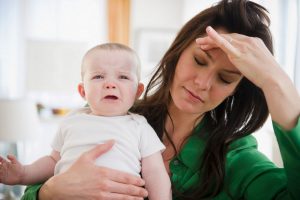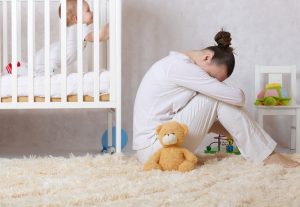
Simply put, postpartum depression is the presence of a clinical depression during the postpartum period. In that way, postpartum depression is exactly like any other depression that is unrelated to childbirth. But there’s more to it than that,” says Karen Kleiman MSW, LCSW.
There are common misconceptions that add further insult to injury.
It’s quite funny and distressing, at the same time, to hear things that clueless people say about postpartum depression(PPD) or depression in general. A lot of people believe that the condition is not real or is just something that came along with the pregnancy which will eventually go away once the beautiful baby is born.
“Post-partum depression is common. Ten to twenty percent of women experience significant depressive symptoms after the birth of a child. Of these, 5 to 10% experience severe depressive symptoms, meaning that about 1% of women develop a severe depression after childbirth,” according to psychiatrist Eugene Rubin M.D., Ph.D.
But the truth is, postpartum depression is real and scary,and women who suffer from it need a lot of help. For this reason, we are breaking down some of the trivial misconceptions that people have believed for the longest time about PPD.
Postpartum Depression Is Not Normal
To think that PPD is just part of childbearing is causing the condition to evolve into something more severe and life-threatening. One in seven women is expected to have PPD sometime in her life. PPD does not go away quickly and can re-appear even after you already have a second child. If left untreated, the condition intensifies and gets in the way of caring for the mom and the baby.
Postpartum Depression Is Not Tears Of Joy

When you see moms crying now and then for no apparent reason, it’s definitely not tears of joy; but tears of emptiness and despair. Postpartum depression can cause mothers to feel despondent coupled with other symptoms like guilt, worthlessness, fear, anxiety (or in worse case scenarios, panic attacks), irritability, agitation, loss of appetite and sleep, and isolation. So when someone in your family is weeping uncontrollably for two weeks or more and the other symptoms mentioned are noticeable, it is more likely that the person has PPD.
Postpartum Depression Is Not A Side Effect Of Childbirth
One of the primary reasons why postpartum depression occurs is because the mother is already experiencing depression during her pregnancy. Studies revealed that at some point in the woman’s pregnant life, she would be undergoing mild symptoms of PPD. Due to the impression that pregnancy may cause depressive symptoms as a result of hormonal imbalance, these manifestations are usually “shrugged off” with the hope that it will be over once the baby’s been delivered.
Postpartum Depression Is A Weakness
On the contrary, PPD has nothing to do with the mom’s inability to give birth to a child. Various determinants affect postpartum depression and being weak is not one of them. Apart from already being a superhero for bearing a baby for nine years or so and bringing that baby to the world, women who have PPD are strong enough to handle everything at once. PPD is attributed to the massive drop in hormones, social issues, sleep and nutrition deprivation, inadequate support system, and the piling up of one challenge after the other. Having a baby and depression at the same time is anything but weak.
Postpartum Depression Is Only For Mothers

Depression happens regardless of age, race, ethnicity, education, culture, or gender; therefore, postpartum depression can also affect fathers. Around 10% of first-time fathers will struggle with PPD which usually occurs from the moment the baby is born and can last for six months. Adoptive parents and members of the LGBT community are at risk as well. They will feel the same symptoms as the mothers did. If in case both parents are suffering from PPD, it is critical to seek help as soon as possible.
Postpartum depression should not be faced alone; mental illnesses must always be treated and must have a dependable support group. Remember, postpartum depression is not your fault, and neither is the baby’s fault. So, when you think that you are on the brink of hurting yourself or the baby, immediate help is required.
“It takes courage and strength to seek therapy. It is something that should be celebrated and honored, because it is such an important act of self-care at the most fundamental level of health and wellness,” says Eric Hotchandani, a therapist.